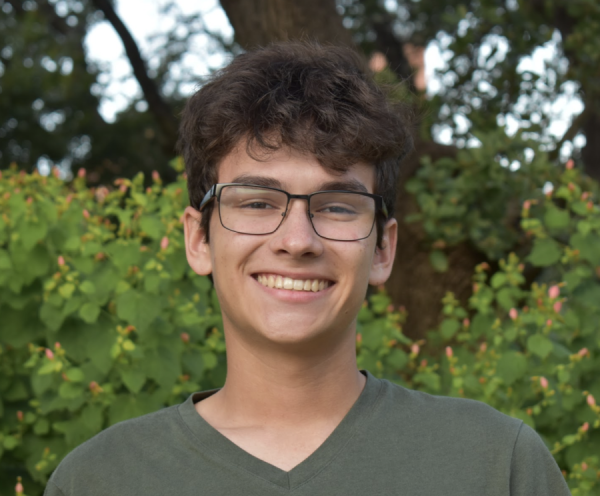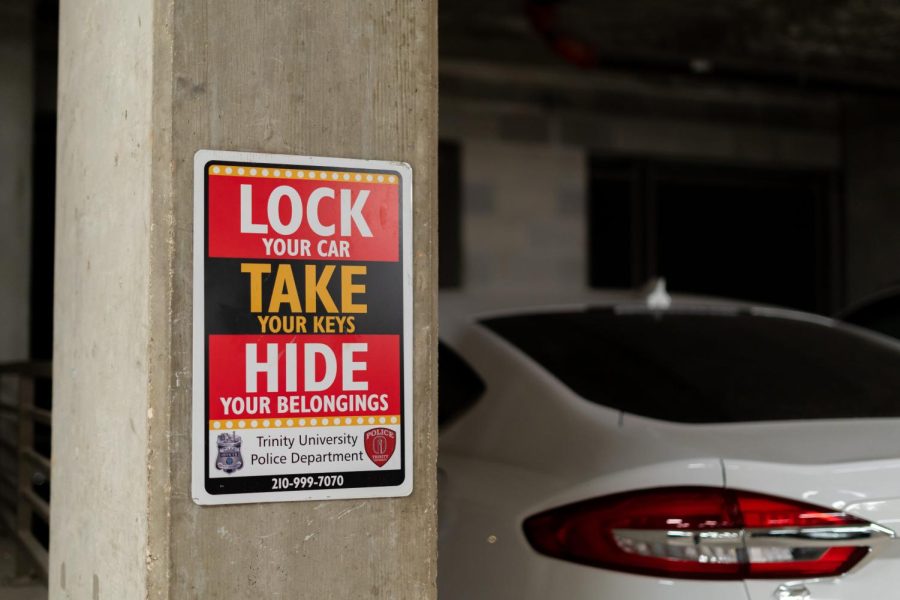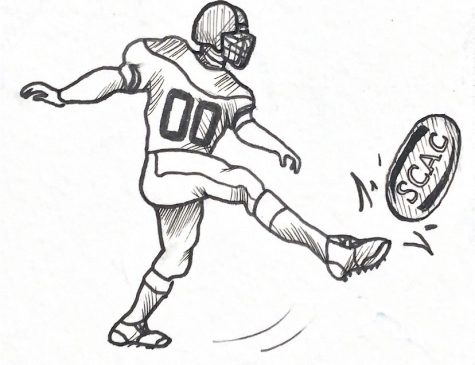Raising the alarm: Car break-ins on campus
Seven vehicle-related thefts have taken place at Trinity since the beginning of the school year
A TUPD sign reminds City Vista residents to secure their cars to prevent theft.
Campus safety, whether walking alone at night, ensuring the privacy of your dorm or navigating the narrow parking lots, is a concern for students and faculty alike. Vehicle safety adds another layer to what it means to be safe on campus. Finding parking in the midst of thousands of other students and faculty as well as constant visitors during school events is a challenge. Feeling confident in the security of your car and the possessions inside of it is an ever-growing worry.
There have been seven vehicle-related thefts on campus since the beginning of the school year, according to Lieutenant Bernadette Gomez of Trinity University Police Department (TUPD).
This is not necessarily a statistically significant increase, though. As Gomez notes, the campus is at risk due to its proximity “to downtown and [its easy access] to the highway.”
This year is like many others. The past three years have seen six, fifteen and three vehicle-related crimes respectively according to Gomez. Although relatively rare, students should still be conscious of the issue.
Sophie Lawrence, sophomore biology major, is one student who has had their catalytic converter stolen. In fact, three catalytic converters were taken on campus between Aug. 19 and Aug. 22, as reported by the community crime alert from TUPD.
These thefts are occurring all around campus, according to Gomez, but particularly in “Lot X, lot T, lot S and CityVista.”
Along with the catalytic converters, Toll Tags, garage door openers, license plates, laptops, iPads, headphones, backpacks and speakers have been robbed from cars all across campus.
Gomez states that these thefts most often occur “overnight” but that it has “not been unusual … to also occur during the daytime.” Due to the pervasiveness of these burglaries, TUPD is taking measures to protect the students and faculty on campus.
Gomez reports that TUPD has “directed-patrol assignment[s] for [their] officers,” where they must “solely [patrol] all campus areas that are being targeted.”
The apps “See Say” and “Elerts” are also in place for students to reach out for help from TUPD. Furthermore, filing a report with the police if an event like this takes place is important; Their emergency line, 210-999-7000, and their non-emergency line, 210-999-7070, are also available to students.
TUPD offers resources and serves as a deterrent, but car owners can take steps to protect themselves as well. TUPD and Gomez suggest taking precautions to prevent theft. Drastic measures, such as avoiding parking on campus entirely, are not necessary.
Gomez still recommends that everyone should remove “valuables from [their] vehicle or put them in [their] trunk,” making sure that “all [of their] windows,” including the sunroof, if applicable, are closed.
Students should also attempt to “park in well-lit areas and remove your keys from your vehicle and lock your doors.”
The TUPD community crime alert even proposes that students should consider installing “a car alarm [that sets] off when it detects vibration.”
These crimes have affected the victims beyond the loss of property since car break-ins constitute an invasion of privacy. After her catalytic converter was stolen, Lawrence is “hesitant to park” in the lot of the crime. However, the resources provided together with simple precautions still allow for a sense of security on campus.
The best one can do, especially when being consistently on campus, is to be conscious and aware of the issue. Knowing how to prevent it and how to report it is the best course of action.

Hi! My name is Samara Gerstle (she/her), and I’m the news section editor for the Trinitonian this year! I’m a sophomore, and this is my second year...

My name is Sam (he/him) and I'm a photographer here with the Trinitonian. I'm a senior Communications and German double major from Austin, Texas, and...
















